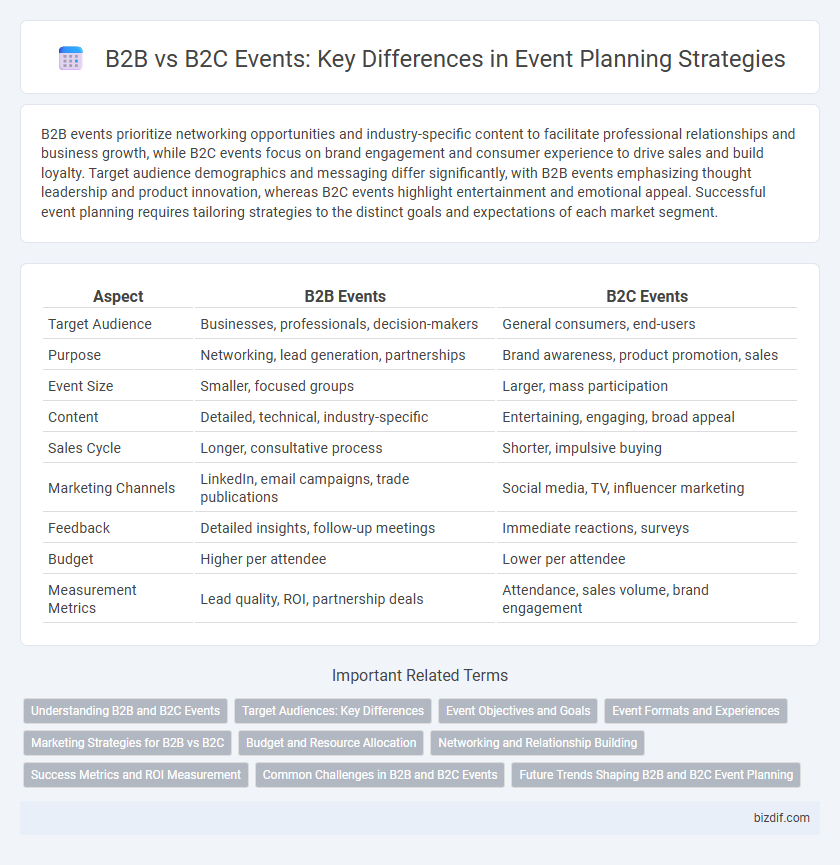B2B events prioritize networking opportunities and industry-specific content to facilitate professional relationships and business growth, while B2C events focus on brand engagement and consumer experience to drive sales and build loyalty. Target audience demographics and messaging differ significantly, with B2B events emphasizing thought leadership and product innovation, whereas B2C events highlight entertainment and emotional appeal. Successful event planning requires tailoring strategies to the distinct goals and expectations of each market segment.
Table of Comparison
| Aspect | B2B Events | B2C Events |
|---|---|---|
| Target Audience | Businesses, professionals, decision-makers | General consumers, end-users |
| Purpose | Networking, lead generation, partnerships | Brand awareness, product promotion, sales |
| Event Size | Smaller, focused groups | Larger, mass participation |
| Content | Detailed, technical, industry-specific | Entertaining, engaging, broad appeal |
| Sales Cycle | Longer, consultative process | Shorter, impulsive buying |
| Marketing Channels | LinkedIn, email campaigns, trade publications | Social media, TV, influencer marketing |
| Feedback | Detailed insights, follow-up meetings | Immediate reactions, surveys |
| Budget | Higher per attendee | Lower per attendee |
| Measurement Metrics | Lead quality, ROI, partnership deals | Attendance, sales volume, brand engagement |
Understanding B2B and B2C Events
B2B events target business professionals, emphasizing networking, industry insights, and lead generation, while B2C events focus on consumer engagement, brand experience, and direct sales. B2B events often feature seminars, trade shows, and workshops tailored to niche markets, contrasting with the mass appeal of product launches, festivals, and retail promotions common in B2C. Understanding these distinctions helps optimize event strategies for audience engagement, ROI, and long-term business relationships.
Target Audiences: Key Differences
B2B events primarily target industry professionals, decision-makers, and business executives who seek networking, partnerships, and industry insights, emphasizing relationship-building and lead generation. B2C events focus on a broader consumer audience interested in entertainment, product experiences, and brand engagement, aiming to drive direct sales and enhance customer loyalty. Understanding these distinct target audience motivations is crucial for optimizing event content, marketing strategies, and overall engagement metrics.
Event Objectives and Goals
B2B events prioritize networking, lead generation, and fostering long-term partnerships, focusing on industry insights and business growth. B2C events aim to enhance brand awareness, drive immediate sales, and create memorable customer experiences. Clear event objectives differ as B2B targets professional engagement while B2C centers around consumer entertainment and loyalty.
Event Formats and Experiences
B2B event formats often include conferences, workshops, and networking sessions designed to facilitate knowledge sharing and professional connections, emphasizing targeted content and industry-specific experiences. B2C events focus on immersive experiences such as product launches, festivals, and experiential marketing activations that prioritize engagement, entertainment, and brand interaction. Customizing event experiences based on audience type enhances attendee satisfaction and drives measurable business outcomes.
Marketing Strategies for B2B vs B2C
B2B event marketing strategies prioritize relationship-building, leveraging personalized outreach, targeted content, and lead nurturing to engage decision-makers within specific industries. In contrast, B2C events emphasize brand awareness and emotional connection, utilizing mass media, social media campaigns, and experiential activations to attract a broad consumer audience. Data-driven segmentation and ROI tracking are crucial for optimizing both B2B and B2C event marketing effectiveness.
Budget and Resource Allocation
B2B events typically require higher budget allocation focused on targeted networking opportunities, advanced technology integration, and personalized attendee experiences. Resource allocation for B2B events emphasizes strategic partnerships, expert speakers, and lead generation tools to maximize ROI. In contrast, B2C events prioritize broader marketing outreach with larger audience engagement, often allocating more budget to entertainment, venue aesthetics, and mass communication channels.
Networking and Relationship Building
B2B events prioritize targeted networking opportunities, fostering long-term professional relationships through industry-specific interactions and knowledge sharing. B2C events emphasize broader audience engagement, aiming to build brand loyalty and customer connections through experiential activities and direct consumer feedback. Effective event planning tailors strategies to maximize relationship-building potential based on the distinct goals of B2B and B2C environments.
Success Metrics and ROI Measurement
Success metrics for B2B events prioritize lead generation quality, conversion rates, and account engagement levels, while B2C events focus on audience reach, brand awareness, and direct sales impact. ROI measurement in B2B events involves tracking long-term client acquisition value and pipeline growth, contrasted with immediate revenue uplift and customer acquisition cost analysis in B2C events. Leveraging CRM integration and detailed analytics enables precise evaluation of engagement and financial returns tailored to each event type.
Common Challenges in B2B and B2C Events
B2B events often face challenges such as aligning multiple stakeholders' interests, managing longer sales cycles, and delivering complex product demonstrations that require technical expertise; meanwhile, B2C events struggle with high attendee volume management, creating engaging experiences that drive emotion-driven purchases, and maintaining brand loyalty in competitive markets. Both B2B and B2C organizers must address logistical issues like venue selection, attendee engagement, and data privacy compliance to ensure seamless execution. Effective communication strategies and technology integration play crucial roles in overcoming these common hurdles and maximizing event ROI.
Future Trends Shaping B2B and B2C Event Planning
Future trends in B2B event planning emphasize hybrid event formats combining virtual and in-person interactions to enhance networking and data analytics for ROI measurement. B2C event planning increasingly leverages immersive technologies such as augmented reality and personalized experiences to boost engagement and brand loyalty. Both B2B and B2C sectors prioritize sustainability and AI-driven personalization, transforming attendee experiences and operational efficiency.
B2B events vs B2C events Infographic

 bizdif.com
bizdif.com